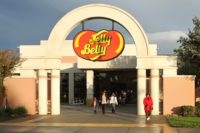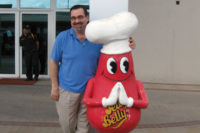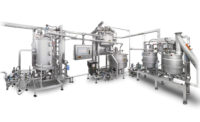|
At a Glance Jelly Belly Candy Co. (Thailand) Headquarters:Rayong, Thailand Plant:62,000 sq. ft. Employees:100 Output:5 million lbs. Products:Jelly Belly beans Management Team:Herm Rowland Jr., managing director; Sharon Duncan, v.p. – international business; Donald Helton, general manager; and Ratchaneekorn Mueanjai, controller. |
“Every spirit makes its house, and we can give a shrewd guess from the house to the inhabitant.”
Ralph Waldo Emerson
First-time visitors to Thailand, particularly those that haven’t done any research on the country or culture, are often amazed to find miniature houses standing in front of homes, hotels, high-rise offices and business headquarters.
These “spirit houses” are meant to provide a home for the spirits of the land displaced by human structures. Building a home for these displaced spirits shows that the new inhabitants respect the spirits of the land. In this manner, humans curry their favor for protection against evil and bad luck while simultaneously soliciting the benevolence these spirits can dispense.
Herm Rowland Jr. has come to acknowledge and respect the power of local customs and traditions. As the managing director for Jelly Belly Candy Co. (Thailand) Ltd. explains, when the company began construction on the 6.5 acres of land in Thailand’s Eastern Seaboard Industrial Estate in December 2006, it was experiencing an extraordinary string of common building delays.
Noting that the work had begun without the installation of a spirit house on site, the company arranged to correct the oversight. A Buddhist monk was called in and a spirit house was purchased to be placed in a location, a spot where it would never be in the shadow of the new building. Then the proper rituals were performed.
Shortly thereafter, work progressed on the site with a lot less difficulty.
Ironically, only a few months earlier, Rowland Jr. would have never dreamed of spirit houses and Buddhist monks if it weren’t for his father, Herm Rowland Sr., announcing to his family that the company was going to build a new manufacturing facility in Thailand.
As Rowland Sr., chairman of Jelly Belly Candy Co., explains, he and Mike Bianco, senior v.p. of manufacturing, had visited several countries in their efforts to locate an offshore site that would service the company’s growing international business.
“I was adamant about being able to own our land and the manufacturing plant abroad like we do here in the United States,” he says.
It was during this search that the Jelly Belly chairman received a call from a friend of his, Mark Mariani, head of Mariani Packing Co., about visiting him and the new facility they had built in Thailand.
“Well, I did just that and spent about two weeks in Thailand,” Rowland Sr. says. “All the key components for making Jelly Belly beans were there: cane sugar at world prices, tapioca syrup and favorable labor costs.”
The Mariani Packing Co. plant was located in an industrial zone — one of six — set up by the Thai government to encourage foreign investment. The Eastern Seaboard Industrial Estate, know as the Detroit of the East because of the large number of automobile plants, offered several incentives.
Thailand’s Board of Investment, the agency charged with helping foreign companies invest in the country saw to it that basics such as water, electricity, an excellent transportation network and access to gas — “We told them that we wouldn’t move in unless they provided us with a gas line; no propane tanks,” Rowland Sr. says — were present.
There was also another advantage in locating within this industrial estate; it had become a “Free Trade Zone.”
“The Free Trade Zone designation allowed us to buy materials and process them for export without paying any Value Added Taxes on the products,” Rowland Sr. adds.
That, coupled with favorable labor costs and reduced ingredient prices, enabled the company to be more competitive globally, the senior Rowland points out, a critical development in helping fuel international sales growth.
That scenario essentially replicated the vision Rowland Sr. foresaw back in 2002 regarding global sales, says Sharon Duncan, v.p. of international sales for Jelly Belly Candy Co.
“He saw the opportunity, but realized that the company wasn’t really strategically focused to take advantage of the situation,” she adds. “Being the great visionary, he decided to commit to an international production facility.”
Plans called for a $10-million investment, one that produced a 50,000-sq.-ft. facility. Construction took longer than expected — almost two years versus nine months — but that involved changing contractors as well as dealing with weather issues and cultural differences, says Rowland Jr.
“Literally, we had two different cultures coming together, learning about each other,” he says. Despite the longer timeline in construction, the plant and manufacturing processes eventually came together, with the company shipping its first container load of Jelly Belly Candy Co. Thailand beans Jan. 26, 2009.
The original design factored in expansions and the company added a 12,000-sq.-ft. mezzanine to accommodate demand and streamline processing and now is working on a 65,000-sq.-ft. addition this year.
Today’s 62,000-sq.-ft. manufacturing facility, which pumps out 2 billion Jelly Belly jelly beans annually, mimicks the company’s U.S. operations in almost all aspects. Excluding sugar, syrup and water, all flavors are imported from the United States.
As expected, the company goes to great lengths to ensure ingredient consistency, says Rowland Jr.
“To produce our Jelly Belly beans, we need different types of sugar, which means ordering different granular sizes,” he explains. “In Thailand, we can’t get that, so we have to screen the sugar ourselves.”
And although the water is perfectly safe to drink at the plant, the company uses additional filters to further purify the water before it’s used in cooking.
Despite the Thai work force not having had any previous experience with confections, or specifically, jelly beans, the newly hired employees picked up the skill sets required fairly quickly, Rowland Jr. says.
Even in that very specific art known as panning, Jelly Belly’s managing director in Thailand says the work crew is “almost there.”
“What’s missing are tricks of the trade acquired through experience. But that will come,” he says.
Today, both Rowland Sr. and Jr. believe that the jelly beans produced in Thailand are virtual twins to their counterparts produced in the States.
“Our goal remains to have the beans, whether they are produced in Thailand or in the United States, be exactly the same,” Rowland Sr. says. “As a result, if you were to lay beans down, you can’t tell the difference between the two.”
And while there are some minimal differences — tapioca syrup versus corn syrup — to Jelly Belly Candy Co.’s credit, consumers haven’t discerned any quality or taste differences. A surge in international sales during the past three years tells the story.
For 2011, international sales increased 25%. Duncan foresees the company doubling its 2011 total by 2014. Currently, the United Kingdom, Germany, Canada and Australia represent the four largest export markets. Last month the company opened an office in Shanghai, China.
“China represents the largest developing market,” Duncan says. The expected emergence of a burgeoning middle class — the country’s middle class hovers near 190 million urban households, or 29%, today, but estimates project this base will to expand to 75% or 372 million by 2025 — portends an explosive market for consumer packaged goods, including confections.
Demographics, be they in China or say India, which also is projected to grow its demand for confections, aren’t the only numbers affecting the company’s international growth.
There are several additional advantages stemming from having a manufacturing facility abroad that are playing a significant role in the growth surge, says Duncan.
One of them involves the use of tapioca syrup, which is a non-GMO ingredient. Given that most European retailers insist on a GMO-free ingredient statement, the availability and costing of tapioca syrup in Thailand allows the company to meet this requirement.
In addition, because the facility in Thailand operates on a smaller scale than its U.S. counterparts in California or Illinois, the company has more production and packaging flexibility.
“One of the key differences in the international market is that retailers and consumers prefer small pack sizes,” Duncan says. Hence, the popularity of 30- and 50-gram flip-top boxes and 100-gram re-sealable pouch bags.
A new 65,000-sq.-ft. addition, currently under construction and projected to be completed by July 2012, will further expand those packaging capabilities.
“Our sales department has been asking us to develop a high-style package,” says Rowland Sr. “We’ll do so gradually, but we’ve committed to a new packaging line that is completely automated.”
Rowland Sr. looks to install the first turnkey line in the company’s North Chicago plant, then add additional lines in California and Thailand.
As he points out, “You can’t continuously grow by raising prices. You have to offset overhead costs through automation. It’s a matter of turning out more pounds, more packages with your existing labor force.”
Besides providing more packaging capabilities, the addition will expand space for the mixing of candies and storage of finished goods. The company also looks to add production capability for additional confectionery items besides jelly beans, Rowland Jr. adds.
It’s been a long journey since that first visit by Herm Rowland Sr. to Thailand back in 2005. Under direction from Rowland Jr. and Bianco, that vision has become reality.
Throughout the commingling of cultures journey, which includes kosher certification by the Orthodox Union, one element hasn’t changed — an unwavering desire to make this experiment work. That determination has helped make Jelly Belly Thailand a success.
Of course, as Rowland Jr. points out, one should never discount help or good luck from the spirit lords.
It must be the Jelly Belly wai.

















